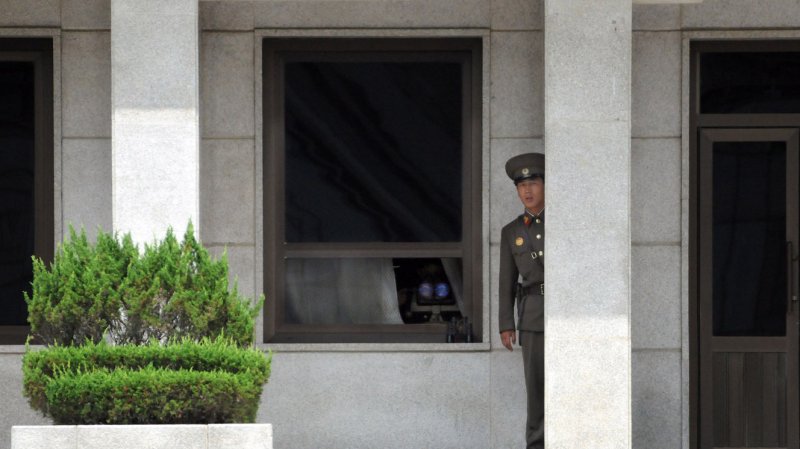A North Korean soldier stands watch on the North Korean side of the Demilitarized Zone seen from Panmunjom, South Korea on July 17, 2008. (UPI Photo/Spike Call/US Navy) |
License Photo
SEOUL, April 16 (UPI) -- North Korean leader Kim Jong Un said in his first televised speech -- and only days after an embarrassing failed rocket launch -- that he will boost the country's military strength.
The policy of "military first" remains the cornerstone of the communist state's strength, Kim said in his open air address to an armed forces parade in the main square of Pyongyang.
Kim was speaking during celebrations to mark the centenary of the birth of the country's founder, his grandfather Kim Il Sung, and his own father Kim Jong Il who died in December.
Kim read from a prepared script during the march, which included thousands of soldiers as well as military vehicles, some carrying rockets, the BBC said.
"I express my greetings to our compatriots in South Korea and across the world who dedicate themselves to reunification and the prosperity of the nations," Kim said in his 20-minute speech.
He also said "superiority in military technology is no longer monopolized by imperialists and North Korea has to make "every effort to reinforce the People's armed forces."
Along with the usual references to maintaining military strength, Kim was seen laughing and joking with senior officials.
His performance was in marked contrast to that of the image of his father who is believed to have made only one public speech in his 17-year rule, the BBC said.
Kim made no reference to last week's failed launch of North Korea's $1 billion satellite Kwangmyongsong-3 at the Sohae Satellite Launching Station, an event that was to bolster the 100th anniversary celebrations.
The official government Korean Central News Agency said only that "the Earth observation satellite failed to enter its pre-set orbit" and that "scientists, technicians and experts are now looking into the cause of the failure."
The launch was criticized heavily by many countries, including China.
The West, including the United States, called the satellite a thinly disguised military test flight for a rocket capable of carrying a nuclear warhead.
Shortly after the launch-date announcement, Chinese Vice Foreign Minister Zhang Zhijun met with North Korean Ambassador Ji Jae Ryong "to express China's worry over the matter," Zhang was quoted as saying by China's state-run news agency Xinhua.
"We sincerely hope parties concerned stay calm, exercise restraint and avoid escalation of tension that may lead to a more complicated situation," he said.
The launch was Pyongyang's second attempt to put a satellite into orbit after what most observers said was a botched first attempt in 2009.
Kim Jong Un, believed to be in his late 20s, has little military background although the military and the ruling Workers Party, of which Kim is head, are inextricably linked. His two dead older brothers were generals -- Kim Song U died in 2009 and Kim Song Gil died in 2006.
Kim's lack of military credentials was seen a flaw in his leadership's armor.
However, despite the rocket launch failure, Kim's grip on national leadership was further enhanced last week when North Korea's rubber stamp legislative body the 12th Supreme People's Assembly elected him as first chairman of the country's National Defense Commission.
The "auspicious event" provides "an eternal guarantee for glorifying Korean-style socialism," a report by the KCNA said.















